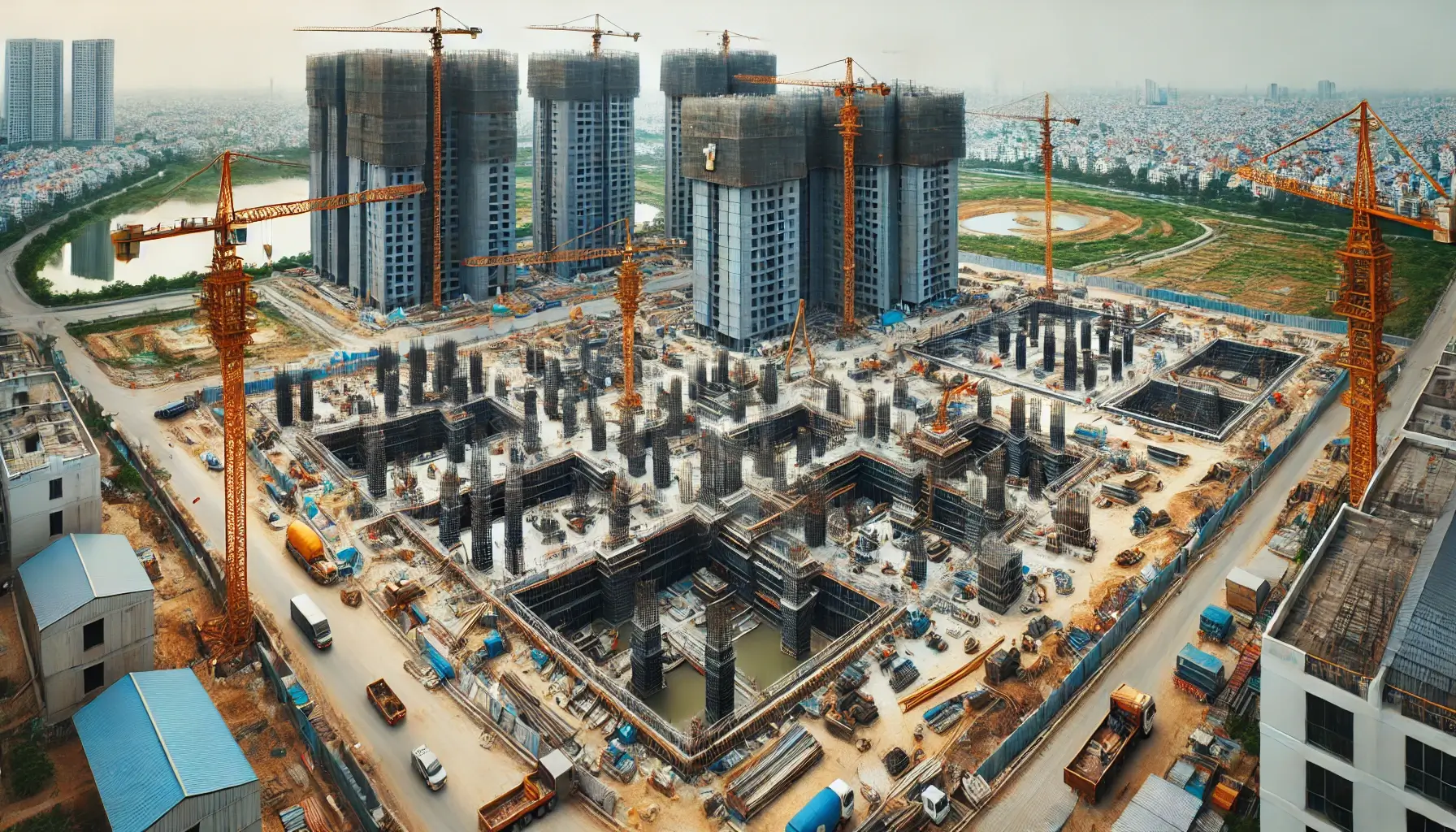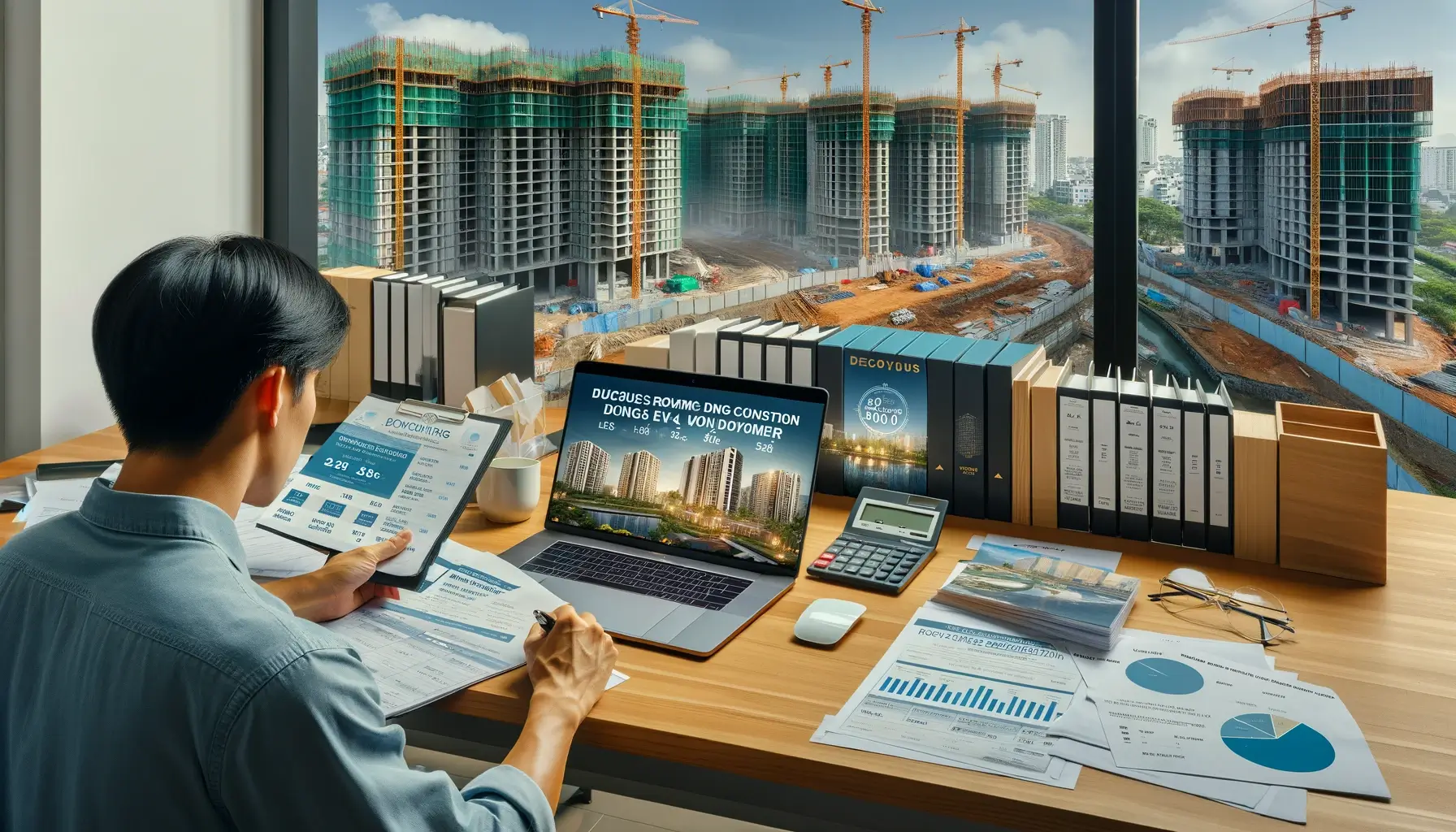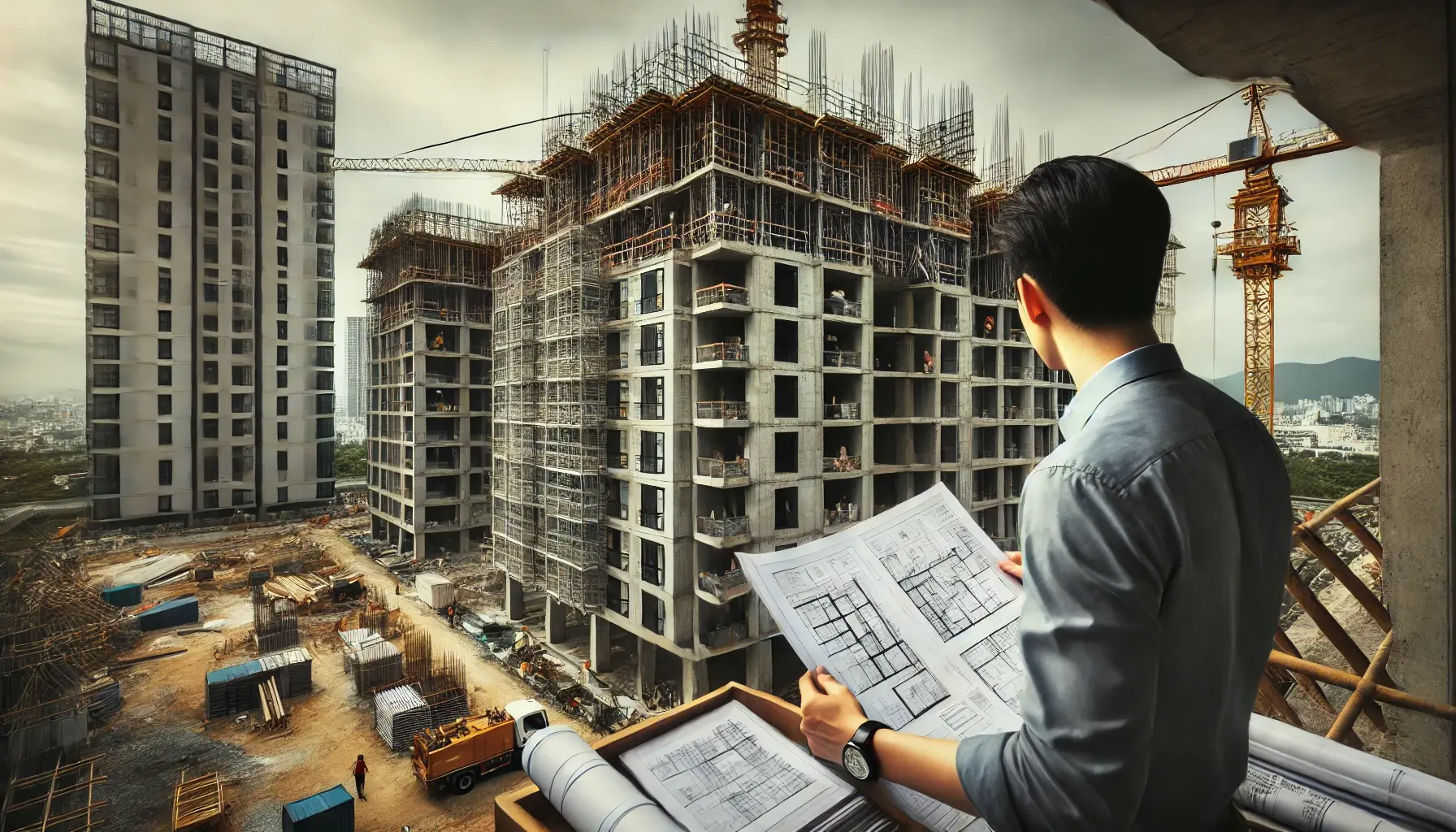Buying a Condo in Early Sales: Considerations & Risks
Buying a Condo in Early Sales phase can feel like a high-stakes gamble with great profit potential but also significant risks. Ngọc Thành Vinhomes is here to guide you through the key considerations—evaluating the developer, checking the legal status, and scrutinizing the price and contract terms—so you can make a well-informed investment decision.
Nội dung bài viết
ToggleHidden Risks When Buying Apartments in the Initial Sales Phase and How to Avoid Them

Legal Risks: Legal issues are perhaps the biggest concern for home buyers. A project that is incomplete in terms of legalities can lead to various problems, including ownership disputes, delays in receiving the property title, or even construction halts.
- How to Avoid:
- Request full legal documentation from the developer: Be proactive and ask for documents such as the building permit, land use rights, project approval decision (1/500 plan), and sales authorization.
- Verify information with local authorities: Check the project’s legal status on the website of the Department of Construction or other relevant agencies.
- Consult a lawyer: If you’re not familiar with legal matters, seek advice from a lawyer or legal expert to review the project’s legal status and the sales contract.
Construction Delays: “Money in, goods delivered” is what everyone hopes for, but it doesn’t always happen smoothly. Construction delays or failure to deliver on time can disrupt your financial plans and affect your daily life.
- How to Avoid:
- Research the developer’s track record: Investigate the developer’s past projects, including their delivery timelines and the quality of completed properties.
- Read the sales contract carefully: Pay close attention to the clauses related to delivery deadlines, payment schedules, and penalties for contract breaches.
- Monitor construction progress: Regularly check the project’s construction progress through official updates from the developer or by visiting the site.
Quality Issues: You may expect a dream home, but upon receiving it, the construction quality could fall short, with poor materials or designs that don’t match the initial promises.
- How to Avoid:
- Request detailed information from the developer: Ask for specifics on construction materials, interior equipment, and technical standards.
- Visit the model homes and completed projects: If possible, visit the model homes and completed projects from the developer to assess the actual quality.
- Scrutinize the sales contract: Focus on the clauses regarding warranties, repairs, and the developer’s commitments to quality.
Financial Risks: The real estate market is always fluctuating. If the developer faces financial difficulties, the project could fail, and the value of your apartment could decrease or be lost entirely.
- How to Avoid:
- Evaluate the financial strength of the developer: Research financial reports, ongoing projects, and the developer’s ability to raise capital.
- Analyze the project’s potential growth: Consider factors like infrastructure development, nearby amenities, and the area’s potential for price appreciation.
- Choose a suitable payment and loan plan: Ensure that you have the financial capacity to cover the cost of the apartment and other associated expenses.
Thorough Research on the Developer and Project

Investigate the developer thoroughly: “Reputation” is a key factor. Look into the developer’s history, experience, and completed projects. Don’t hesitate to search for information on forums or social media, or ask previous buyers about their experiences. You can also check for awards and certifications that reflect the developer’s credibility and quality.
Examine the project’s legal status: Legal compliance is the foundation of every real estate transaction. Ensure the project has all the necessary legal documents, such as a construction permit and land use certificate.
- Construction permit: This is the most critical document proving the project has been authorized by government authorities.
- Land use rights certificate: This document confirms the developer’s legal right to use the land for construction.
- 1/500 Project approval decision: This decision details the project’s specific zoning, scale, building density, and public infrastructure.
- Sales permit: Developers can only start selling units once all legal requirements are fulfilled and the appropriate permit is obtained.
Evaluate the location and growth potential of the area: Location is crucial for determining the property’s value and future price appreciation. Projects in prime locations, close to public amenities and with convenient transportation, will generally be more valuable and easier to rent or resell.
- Nearby amenities: Assess whether the project is near public amenities like schools, hospitals, supermarkets, and parks.
- Transportation: Evaluate the project’s connectivity to other parts of the city.
- Infrastructure development: Investigate upcoming infrastructure projects such as roads, public transport, and community facilities.
Consider internal and external amenities: Amenities play a vital role in modern living. Look into the internal amenities like swimming pools, gyms, and parks, as well as external facilities like schools, hospitals, and shopping centers nearby.
- Internal amenities: These amenities provide convenience and improve the quality of life for residents. Make sure the project meets your personal preferences and needs.
- External amenities: These are equally important and impact your daily convenience. Ensure the project is located near essential services.
Carefully Review Prices and Promotions

Compare prices with similar projects in the area: Don’t be swayed by flashy marketing promising “super attractive prices.” Compare the project’s price with others in the area to get a realistic sense of whether the price is fair. You can gather information from real estate websites, news outlets, or consult industry experts.
Evaluate promotions: Promotions like discounts, interest rate support, and gifts can save you a lot. However, be sure to carefully review the terms and conditions to avoid surprises later on.
- Discounts: This is the most common promotion, offering direct price reductions to buyers.
- Interest rate support: The developer or partner banks may offer to cover a portion of your mortgage interest for a set period.
- Gifts: Developers might offer valuable gifts like furniture, home appliances, or shopping vouchers.
Thoroughly check the terms and conditions: Attractive promotions often come with specific conditions or limitations. For example, discounts may only apply to certain units or require a significant upfront payment. Be sure to read the fine print to fully understand your rights and obligations, avoiding misunderstandings or disputes later on.
Carefully Review the Sales Contract
Understand the payment, delivery, and penalty clauses: The sales contract is a critical legal document outlining the rights and obligations of both parties. Carefully read each clause, especially those related to payment schedules, delivery deadlines, and breach of contract penalties. If you find any unclear or unfavorable terms, ask the developer or sales representative for clarification. Don’t hesitate to negotiate adjustments that better protect your interests.
- Payment schedule: The contract will specify when payments are due and how much is to be paid at each milestone. Make sure you can comfortably meet these payment obligations.
- Delivery schedule: The contract will also specify when the apartment is expected to be handed over. Pay attention to clauses about delivery delays and remedies if the developer fails to deliver on time.
- Breach of contract clauses and penalties: The contract will outline scenarios where either party may breach the agreement and the corresponding penalties.
Consult a lawyer or expert before signing: If you lack expertise in legal matters, seek advice from a lawyer or real estate expert to review the contract before signing. They can help you identify any risks, understand complex legal terms, and ensure your rights are fully protected.
Monitor Construction Progress and Quality

Regularly update yourself on construction progress: Don’t just sit back and wait for the delivery date. Proactively track the project’s progress through official updates from the developer, progress reports, or by visiting the construction site.
Inspect materials and design whenever possible: Once part of the project is completed, take the opportunity to check the quality of the building materials, design, and layout. If possible, bring along a construction expert or architect for a more accurate assessment. If any issues are found, promptly address them with the developer to ensure timely resolution.
**Demand written commitments from
the developer on progress and quality:** Don’t rely on verbal assurances. Request written guarantees from the developer regarding construction progress, delivery timelines, and quality standards. These commitments should be clearly documented in the sales contract or attached as addendums. This will safeguard your interests in case of delays or quality issues.
Choose an Appropriate Payment and Loan Plan
Consider payment options carefully: Developers often offer multiple payment options, such as installment payments aligned with construction progress or lump-sum payments. Each option has its pros and cons. Assess them thoroughly based on your financial capacity and choose the one that works best for you.
- Installment payments: This is the most common option, allowing you to spread payments over the construction period. It reduces financial pressure but requires a steady flow of funds for future payments.
- Lump-sum payments: This option typically comes with attractive discounts or other benefits but requires you to pay the full amount upfront.
Research preferential loan packages from banks: If you need a mortgage to purchase the apartment, explore preferential loan packages from banks partnered with the developer. Compare interest rates, loan terms, and other benefits to select the package that best suits your financial situation.
- Interest rates: This is the most critical factor when choosing a loan package. Compare rates across different banks to find the best deal.
- Loan conditions: Banks will have different eligibility requirements, such as minimum income, employment history, and proof of income. Ensure you meet these conditions before applying.
- Loan duration: The longer the loan term, the lower your monthly payments, but the higher the total interest paid. Balance your monthly repayment capacity with the total cost of the loan.
Ensure you have the financial means to meet payments: Before committing to a purchase, carefully calculate your financial capacity. Ensure you can comfortably meet payment schedules as well as cover additional expenses like maintenance, management, and service fees. Create a detailed financial plan and set aside a contingency fund for unforeseen circumstances to avoid financial stress after purchasing the home.
Advice from Ngọc Thành Vinhomes
Buying an apartment during the initial sales phase is a significant decision that requires careful consideration and thorough research. We hope this guide from Ngọc Thành Vinhomes provides you with valuable insights and the confidence to make a wise investment choice. If you have any questions or concerns, feel free to leave a comment below or contact us directly. The Vinhomes team is always ready to assist you.
Don’t forget to share your thoughts and experiences on buying apartments during the early sales phase by leaving a comment below. Visit vinhomesplace.com for the latest real estate market news and updates on Vinhomes projects!














